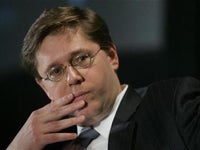 |
Kevin Martin at the CES 2008 show in January. (Reuters) |
UPDATED: A new report from a House committee is blasting the way the Federal Communications Commission Chairman Kevin Martin managed the agency during his nearly three-year tenure.
The 110-page report (PDF), entitled “Deception and Distrust: The Federal Communications Commission Under Chairman Kevin J. Martin,” alleges that Martin “manipulated, withheld or suppressed data, reports and information,” particularly in his dealings with the cable industry.
It also accuses Martin of operating the agency under a shroud of secrecy.
In case President-elect Barack Obama was mulling keeping the Republican Martin on the job, the report by key Democratic House members makes it clear they want him out.
The report is the result of a nearly year-long investigation led by Energy and Commerce Committee Chairman John Dingell, D-Mich., and Bart Stupak, also a Michigan Democrat, who chairs the Subcommittee on Oversight and Investigations.
“Our investigation confirmed a number of troubling allegations raised by individuals in and outside the FCC,” Stupak said in a statement. “The committee staff report details some of the most egregious abuses of power, suppression of information and manipulation of data under Chairman Martin’s leadership.”
Among the other charges, the report characterizes Martin’s management style as “heavy-handed, opaque and non-collegial,” leading to “distrust, suspicion and turmoil among the five current commissioners.”
The report claims that that Martin ignored warnings that federal subsidies administered by the FCC were overcompensating companies providing telecommunications relay services (TRS) for the hearing- and sight-impaired, which are required under the Americans With Disabilities Act.
Martin “permitted an unjustified rate increase that will cost consumers as much as $100 million per year in excess charges,” the report said.
It also accused the chairman of manipulating the findings of reports probing various aspects of the cable industry and choking off further inquiry into the reviews. Martin has been an outspoken opponent of the billing structures of the cable industry, and has championed the a la carte model as a way to lower prices and improve competition.
Rob Kenny, a spokesman for Martin, fired back in a statement that the committee’s report boils down to those two principal allegations, both of which he said Martin would not apologize for.
“After a year of investigation, the Committee’s primary criticism of the chairman is that he spent too much money to ensure that deaf Americans have equal access to communications services,” Kenny said.
“The other major criticism of Chairman Martin is that he believes cable rates are too high and that he has sought to enhance choice and competition in the market for video services,” he continued. “With cable rates having doubled over the last decade, he will continue [to] advocate on behalf of the millions of cable subscribers.”
But the report contains numerous other allegations, including the charges that Martin suppressed inquiries into e-911 services, “cherry-picked” evidence in a study of broadband-over-powerline services, and forced senior staff into retirement or transferred them to lower-level positions for voicing conflicting opinions. The report said the practice is commonly known as being “Martinized.”
Kenny took issue with those charges, as well, telling InternetNews.com that “Chairman Martin has run the commission as chairman the exact same way it’s been run since he came here as a staffer.”
He pointed out that many of the report’s accusations touch on issues involving the cable industry, which Martin has never shrunk from criticizing for what he sees as anti-consumer excesses.
“The chairman’s been a very vocal advocate of consumer protection, and he’s unapologetic for keeping the consumer’s best interest in mind, and he will continue to do so.”
The investigation included a review of hundreds of thousands of electronic and paper documents, as well as interviews with 73 current and former FCC staffers and telecom industry insiders, but kept their identities a secret.
“Normally, in the course of an investigation of this nature we would recommend that a hearing be held to receive testimony from witnesses and to further examine the issues,” the authors of the report wrote. “Due to the climate of fear that currently pervades the FCC, however, we found that key witnesses were unwilling to testify or even have their names become known. Therefore, we recommend that the committee issue this report in lieu of a hearing to protect the many honest people who came forward under a promise of protection or anonymity.”
The report said that Martin and several of his key staffers either ignored or declined the committee’s request to meet. The authors said that the FCC had also not provided some of the evidence requested.
“We’re not aware of anything we did not provide to the committee that they asked for,” Kenny said.
President-elect Obama will have the chance to appoint a new chairman once he takes office in January. The representatives who led the investigation said they hope their report will serve as a roadmap for Martin’s successor.
“Together, the findings suggest that, in recent years, the FCC has operated in a dysfunctional manner and commission business has suffered as a result,” Dingell said. “It is my hope that the new FCC chairman will find this report instructive and that it will prove useful in helping the commission avoid making the same mistakes.”
Update adds comments from Kenny.


